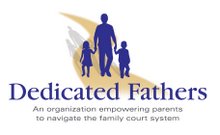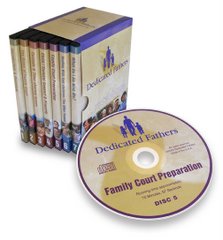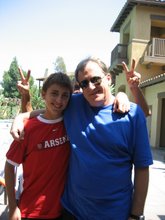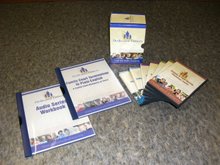Parental Alienation (part 1)
www.dedicatedfathers.org
BY: Marvin L. Chapman
Within the mental health field there continues to be an ongoing debate as to whether or not there is such a thing as parental alienation. Some research appears to support the notions behind parental alienation and its effects on children, and yet other research appears to refute it. However, for those of us in the trenches - especially those of us who have spent years in the family court arena - there is no doubt about parental alienation and its consequences.
Parental alienation is generally defined as one parent repeatedly and continuously programming or brainwashing their child against the other parent. Parental alienation may include such acts as obstructing, interfering or outright denying the child’s right to spend time with the other parent. It usually includes statements that the other parent does not care about the child, is too busy for the child, or similar statements all used to coerce the child into believing the other parent and even their extended family do not love the children or care about them anymore. Such begins the breaking down of the parent-child relationship. In its worst form, parental alienation involves false allegations of abuse, neglect, or some other form of alleged harm to the child.
Of the research I have read, most of those opposing the notion of parental alienation have a clear bias towards mothers. This is not surprising given the fact the mother is almost always the parent who attempts to alienate the children, very seldom the father. Those who oppose the notion of parental alienation overwhelmingly state that if there is any real alienation, then it comes from the fathers’ own actions and not due to any wrongdoing on the part of the mother. It appears to me that those who buy into the notion only mother’s can nurture and care for children also buy into the notion that mother’s would never purposefully and systematically alienate the children against their father.
In over 26 years within the family courts, I can categorically state parental alienation is very real in family law. Anyone spending half a day in any family court will clearly see the systematic alienation that is perpetrated in many cases (but then going to court and finding out what really goes on is NOT scientific study - it’s REALITY). Some form of parental alienation is in about fifty percent (50%) of all of my cases as indicated by the following:
The number 1 complaint of all fathers I have seen in over 25 years is that the mother is causing interference, obstruction and denial of their children’s right to spend time with the father.
The number 2 complaint of all fathers I have seen in over 25 years is that the mother is repeatedly and continuously making degrading and derogatory remarks about the father either directly to the children, or at the very least within hearing distance of the children.
The number 3 complaint of all fathers I have seen in over 25 years is that the mother prevents or severely limits the father from having any significant say in the lives of their children as to health decisions, educational decisions, extra-curricular activities and other general welfare decisions - actions which are made solely and unilaterally by the mother.
As stated above, I have found some form of parental alienation in about fifty percent (50%) of all of my cases for over 26 years as outlined above. Therefore, for me and my clients, parental alienation is extremely common. No only are these acts alienating the children, I support the notion that such acts rise to the level of child abuse. It is abusive for one parent to interfere, obstruct or denial children their right to spend time with the other parent. It is abusive for one parent to continuously make degrading and derogatory remarks about the other parent, whether directly to the children or within hearing distance of the children. And it is abusive for one parent to make sole unilateral decisions about the children without any significant input from the other parent - basically cutting the other parent out of the decisions making process for their children.
Unfortunately, what I call child abuse, family court judges call “primary physical custody to mother.” I see hundreds of clients each year and in over half of those cases I hear at least one (1) of the complaints outlined above. Extrapolate those numbers to the general population and we can only guess at the real number of children being abused through the alienation action of their mother.
The reasons one parent alienates the children against the other parent are as varied as the parents’ themselves. However, there are some attributes which have been identified as being the driving force behind alienating behavior, which are the following:
1. Alienating parents may have feelings of abandonment, anger and rage at the other parent;
2. Alienating parents many times are seeking revenge for perceived wrongs;
3. Alienating parents may have acute or chronic psychological and/or emotional problems;
4. Alienating parents typically harbor resentment from events that happened during the marriage;
5. Alienating parents can be over-enmeshed with their children, resulting in over-protectiveness; and
6. Alienating parents may have an overwhelming need to “prove” they were right and the other parent was wrong.
Likewise, some children are more susceptible to alienation than others and there are some attributes which have been found to be common among children who succumb to alienation tactics, which are the following:
1. Children with a strong psychological bond with the alienating parent;
2. Children with an excessively dependent relationship with the alienating parent;
3. Children who live in fear of losing the alienating parent’s love and support;
4. Children who become overly protective of the alienating parent - sometimes taking on the role of a surrogate spouse (taking “care of” the alienating parent); and
5. Children who respond positively to outside encouragement for expressing their feelings of being abandonment or rejection by the alienated parent.
Please check back next week for part 2 of this article on Parental Alienation.
Be sure to visit our website for more information on divorce and child custody.
www.dedicatedfathers.org
Wednesday, June 27, 2007
Parental Alienation (Part 1)
Posted by
Dedicated Father
at
7:19 PM
189
comments
![]()
Labels: child abuse, child custody, child support, children, divorce, divorce coach, divorce mediation, family court, fathers rights, kids, parental alienation, parenting rights, paternity
Monday, May 21, 2007
Robert and Rob EQUAL parenting bike trek!
Fathers to ride over 600 miles for Equality in Parenting Rights!
From daddyblogger.com
It is official! August 11th 2007 Robert Pedersen and Rob Mackenzie will start their over 600 mile bicycle trek from the Lansing Capitol to Washington, D.C.. This will be an intense multi-day bike trek through numerous states ending in Washington, D.C. where they will be greeted by thousands of people attending the national rally in Washington, D.C. on August the 18th.
It is simply amazing that two fathers are going to attempt this trip all in the name and support of shared parenting! They do this to protect a child's right to EQUAL time with BOTH fit parents! Many elected officials and supporters will see the riders off at the Lansing Capitol and thousands will greet them in Washington, D.C.
Follow this link for the entire story:
http://daddy.typepad.com/daddyblog/2007/04/robert_and_rob_.html
www.dedicatedfathers.org
Posted by
Dedicated Father
at
7:51 PM
4
comments
![]()
Labels: child custody, child support, children, dads, divorce, divorce coach, equal rights, family court, kids, parent, parenting rights
Thursday, May 3, 2007
Child Abuse, Divorce, and Child Custody
ALLEGATIONS OF CHILD ABUSE
Divorce & Child Custody (part 2)
By: Marvin Chapman
www.dedicatedfathers.org
In the California Family Code Section 3027.1 it states the following:
“If a court determines...that an accusation of child abuse or neglect made during a child custody proceeding is false and the person making the accusation knew it to be false at the time the accusation was made, the court may impose reasonable money sanctions, not to exceed all costs incurred by the party accused as a direct result of defending the accusation, and reasonable attorney’s fees incurred in recovering the sanctions, against the person making the accusation.”
In over 26 years in the family court arena, I have never experienced nor have I ever heard of any judge actually determining someone has knowingly made a false allegation of child abuse.
Pretty amazing fact when you consider the following:
Outside of family court: Independent third parties are generally the ones making the allegations.
Outside of family court: Mothers are found responsible for 49% of child abuse cases (with fathers, other relatives and strangers making up the other 51%).
Inside family court: By an overwhelming majority, it is mothers who make allegations against fathers [even though statistically, the mother has a higher probability of committing abuse (49% of all cases as shown above). This fact is totally ignored in family court.
Inside family court: The vast majority of the allegations can not be verified or validated; however, the father is almost always treated as guilty from day one.
Research shows that upon the accusation of child abuse in family court, the presumption of guilt is taken for granted by the majority of attorneys and judges. Therefore from the onset, an accused father is treated as though he were guilty. As indicated in Part 1 of this Allegations of Child Abuse section, in family court (divorce court) child abuse allegations require no proof, no validation, no verification, no police reports, nor any other tangible evidence - the mere unsubstantiated allegation will do.
Research also shows mothers often obtain sole custody of the children, terminate or severely restrict visitation with the father, then request an increase in child support due to the reduced time the father has with his children. All of these consequences tearing apart the restructuring family, severely damaging father-child relationships, injuring the father emotionally, and many times destroying the father financially. All of this trauma built around unfounded false allegations. With such devastating consequences you would think family courts would be more pro-active in going after those who make false allegations. Unfortuantely for the families involved, not only do the courts not go after those making false allegations pro-actively, they don’t go after them at all!
The author of this article, Marvin Chapman, has a great website devoted to fathers rights and divorce. Why not check it out?
Visit www.unitedfathers.org
Defend Your Rights Today!
Order the Dedicated Fathers Audio Series Now!
Posted by
Dedicated Father
at
7:15 PM
7
comments
![]()
Labels: child abuse, child custody, children, dads, divorce coach, domestic violence, family court, fathers rights, kids, paternity
Sunday, April 22, 2007
Divorce & Child Custody - Child Abuse
Divorce & Child Custody:
ALLEGATIONS OF CHILD ABUSE
Part 1 of 2
By: Marvin Chapman
www.dedicatedfathers.org
www.unitedfathers.org
Research verifies mothers are responsible for 49% of all child abuse cases (with other relatives, strangers and fathers making up the other 51%).
In family court, twice as many mothers make child abuse allegations against fathers as do fathers against mothers.
Therefore, the mother making the allegation of child abuse against the father in a divorce is much more likely to be the perpetrator of the abuse than is the father.
Unfortuantely, the above facts are totally ignored by family courts.
In family court, the normal standards of evidence required for common criminals do not apply. In family court, child abuse allegations require no proof, no validation, no verification, no police reports, nor any other tangible evidence - the mere unsubstantiated allegation will do. Research proves upon the accusation of child abuse in family court, the presumption of guilt is taken for granted by the majority of attorneys and judges. Therefore, in family court, unsubstantiated hearsay allegations of abuse is all it takes for a father to be “guilty,” along with all the consequences which go with that “guilty” verdict. From the onset, the father will be treated as though he were found guilty in a real court.
Because the presumption of guilt is taken for granted by the majority of attorneys and judges in family court, the father will almost immediately be separated from his children - at least until he can “prove” his innocence. How does a father prove his innocence? How does he prove something did not happen? The reality is, he can’t. The very fact something did not happen prevents him from proving the non-happening of the non-event. It is a very well known and accepted fact that you can not prove the non-happening of a non-event - that is, except in family court.
During a divorce, the mere allegation of child abuse can and most of the time will cause an irreparable breakdown of the accused parent-child relationship. At the very least the previously healthy parent-child relationship will be disrupted and interfered with unnecessarily. The accused parent will typically become defensive and in the effort to prove their innocence, they will many times unwittingly distance themselves from their child, which is then used against them as verification of some form of abuse. With false allegations of abuse only the mothers win - fathers, children and father-child relationships all lose in some way or another.
Research also shows that mothers often obtain sole custody of their child, terminate visitation with the father, and then request an increase in child support due to the reduced time the father has with their child. All of these consequences tearing apart the restructuring family and damaging the father-child relationship, destroying the father emotionally, and injuring the father financially, are all built around simple unfounded false allegations and hearsay.
Many times the falsely accused parent is stigmatized and their reputation tarnished by the false allegations. This stigma and tarnished reputation may stay with them even if they are eventually found to be factually innocent. Many innocent men lose their jobs, become depressed and walk away from it all. In today’s fear filled society, the mere allegation of child abuse within family court can damage a person for the rest of their lives. Personally, I have had clients commit suicide over such abuse allegations - even after they were determined to be factually innocent of all charges. They could not take their neighbors, former friends and co-workers continued scorn and ridicule.
Regardless of the dire consequences of destroying a man’s life, false allegations of abuse, both spousal and child, are allowed to continue unabated in family court around this country. What most people seem to miss is the fact that it is the children who suffer the most with false allegations of abuse in that their relationship with one of their parents will be irretrievably impaired. Issues of abandonment, rejection, hurt and an overwhelming sense of loss will accompany most of these children for the rest of their lives.
Whether fiction, fantasy, legal ploy, or some other reason, false allegations of abuse are an indication the accusing parent is at the very least immature and over-enmeshed, and at worse, malicious, vindictive and prone to do anything to make the other parent “pay” for their perceived wrongs.
What makes false allegations of spousal abuse and child abuse so absurd is that when the parents were together, the accused parent was a good, decent and trusted parent. But once the breakup began, the accused parent was magically transformed into a mean, angry, abusing man. Why the family court can not see this fact is beyond any sound logical reasoning.
The use of false allegations of spousal abuse and child abuse will only stop when the standard is raised wherein a parent must prove the abuse, verify, validate and substantiate the allegations. Until then, families will continue to be abused by the very system which alleges concerned about the “best interests of the child.” Abusing a parent through false allegations, treating the falsely accused parent as guilty, making orders emotionally rather than logically and with proof, validation, verification and substantiation, are not and will never be in the “best interests of the child.”
Fathers who only months ago were good care-giving, productive and protective fathers are now child abusers. It is insane the courts even allow most of these cases. A simple third party investigation, short and inexpensive, would prove not only did the alleged abuse not happen, the mother knew her allegation was untrue when she made it. Then, and only then, will there cease to be an incentive for these false allegations to be made in the first place.
Like spousal abuse, child abuse allegations require no proof, validation, verification, police reports or any other tangible evidence - the mere unsubstantiated allegation will do very nicely by itself. Just as in false allegations of spousal abuse, false allegations of child abuse are extremely common in family court. Given the current heightened awareness of child abductions and child abuse nationally, there is a lot of emotions around the allegations of child abuse - and family court is almost totally governed by emotions.
Family court judges are given wide discretionary powers unlike any other area of law. This vast discretionary power of family court judges allows them to make their orders without ever having to justify and without ever giving sound logical reasoning for the orders they make.
Just like false allegations of spousal abuse, the mere allegation of child abuse is a winner for mothers. In the majority of cases, the mere allegation of child abuse will subject the father to parenting classes (money), supervised visitation with their children (more money) and a higher child support order (much more money).
If for any reason you suspect the other parent may make allegations against you, if the other parent has a history of repeatedly getting really angry with you, or if the other parent has ever made other false allegations against you (“You don’t love me anymore.”), then you need to take steps to protect yourself and your children.
The Author of this article, Marvin Chapman, has a great website devoted to father’s rights and child custody. Why not check it out? www.dedicatedfathers.org
Also be sure to visit www.unitedfathers.org
Posted by
Dedicated Father
at
6:56 PM
112
comments
![]()
Labels: abuse, advice, child custody, child support, children, dads, divorce, divorce coach, domestic violence, family court, fathers rights, help, kids, parent
Tuesday, March 13, 2007
Collaborative Divorce - options

COLLABORATIVE DIVORCE
A Non-Adversarial Option
www.dedicatedfathers.org
www.unitedfathers.org
A new non-adversarial divorce process is sweeping the country. This new paradigm is known as collaborative divorce. Collaborative divorce is a process involving family law attorneys, mental health professionals and financial specialists, all working together cooperatively to bring about a solution that is fair, just and equitable for all family members.
Collaborative divorce is an out-of-court process that assists husbands and wives to dissolve their marriage in a compassionate, practical and informed way, while proceeding at their own pace - not based on the court’s schedule.
Collaborative divorce is a process that supports the entire family and provides for a smooth transition for all family members.
The collaborative divorce method puts together a professional team for each couple who agree to use the process. Just as in the traditional adversarial process, both husband and wife choose an attorney to represent them; however, these attorneys have been specially-trained in the collaborative process. Joining the team are two or three mental health professionals, one of whom is retained by each spouse as their coach, and one who is hired as the child specialist - serving as the voice of the children. Rounding off the team (if needed) is the financial specialist, who is a certified financial planner, or in some cases a certified public accountant. The attorneys, mental health professionals and financial specialists have received specialized training in the collaborative divorce process.
In the traditional adversarial method, many parents use the process as a therapeutic tool to heal or sooth their pain, to justify their actions, or to seek vindication for the perceived “wrong” of the other parent, all of which become powerful emotional weapons to be used to “win at all costs” - and cost it does, a lot, both emotionally and financially.
In the collaborative process, instead of paying their attorneys to conduct research, discovery and trial preparation to “battle” the other spouse, the parties spend their money on resolving the issues constructively and fairly with the cooperative assistance of their attorneys and other team members. The team is not only committed to keep the parties out of court, they are also there to help the husband and wife transition their marriage into two households in a peaceful, intelligent and restorative manner. Therefore, rather than spending the parties’ resources in numerous court appearances, which have the potential to embitter spouses to exaggerate and exacerbate their differences, the collaborative approach is much less expensive and much less stressful.
The inclusion of the education and information team approach promotes positive healing for all family members, which provides the parties with the opportunity to make the most informed and creative decisions regarding their children. It allows the parties to make intelligent informed decisions regarding the division of their property and the distribution of future support, which will affect the financial future of all family members.
Collaborative divorce is a process which puts the parties directly in charge of their own affairs, a process not typically available under the traditional adversarial method. The adversarial process pits the two attorneys against each other. Then the judge, with no prior knowledge of the family or family dynamics, will make a decision which will affect the entire family for the rest of their lives.
In the collaborative model, power and control is maintained by the family, benefitting all family members by taking into account the uniqueness of each family member.
BY: Marvin Chapman & Dedicated Fathers
Marvin Chapman is a Certified Collaborative Divorce Coach
Order Dedicated Fathers Today!
www.dedicatedfathers.org
Posted by
Dedicated Father
at
6:23 PM
1 comments
![]()
Labels: attorneys, child custody, child support, collaborative divorce, divorce, divorce coach, fathers rights, kids, legal


















